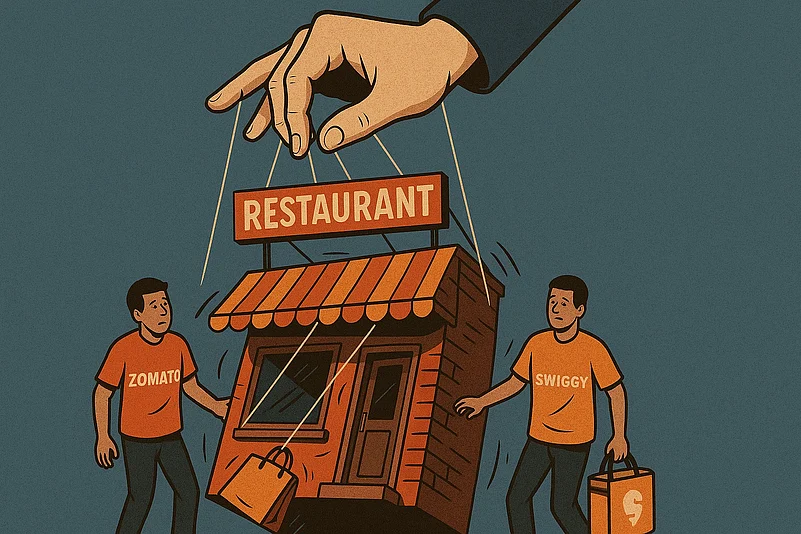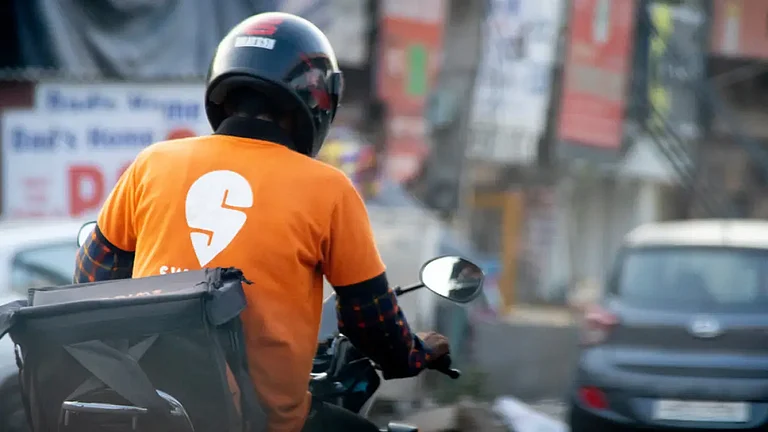Several restaurateurs have recently alleged that food-delivery platforms Zomato and Swiggy are running advertisements and discounts on partner restaurants without their consent. Speaking to Outlook Business, restaurateurs said that in many such cases, the amount credited to the restaurant’s account was lower than expected as the platform deducted charges for ads or discounts, often without prior approval, directly from their earnings.
While this has been happening for over a year, restaurant owners say it has become much more frequent in recent months.
Restaurant owners say they often find promotional offers such as “₹200 off on ₹399” applied to their listings without approval. What was once occasional now happens multiple times a month. They also claim that ads are run without their consent. When concerns are raised with area managers of the food-delivery platforms, “backend technical issues” are cited.
Consent Concerns
While both Zomato and Swiggy have been criticised by restaurateurs for running ads and discounts without consent, the degree and manner of their actions differ.
According to several restaurant owners, Swiggy lacks a clear process to run ads, platform fees, and discounts as its schemes are often implemented without notice or formal agreement. Zomato, by contrast, is said to operate more formally, at least when it comes to advertising. Restaurants report receiving a budget link with unit-wise ad spends (for example, ₹8 lakh for a month), which must be digitally signed via a contract. However, concerns persist even with this model. Even ads that are OTP-approved for a fixed period often auto-renew without notice and run beyond the agreed dates, with deductions going unnoticed until final payout. Zomato later tells restaurants that this was due to a technical error.
Importantly, while OTP-based consent exists in Zomato for ads, multiple restaurateurs confirmed that no such system is in place for discounts. Flash sales and festive offers are launched without informing merchants or seeking approval. In one case, a restaurant that approved 50% off on three items for just two hours found the discount applied to their entire menu for the whole day.
Industry insiders say these practices could be stemming from the duo’s push for profitability and increasing working capital needs to run their quick commerce and events businesses.
Swiggy’s quick commerce unit incurred an operating loss of ₹840 crore in the March quarter, while this figure for Zomato stood at ₹178 crore. To compound Swiggy’s problems, its consolidated business remains loss-making. Not surprisingly, its shares are trading below the price at which the company went public in November last year.
“They’ve started doing things they never did before. It’s clearly about showing strong numbers post-IPO [initial public offering],” a restaurant owner says about Swiggy.
Swiggy didn’t respond to Outlook Business’ queries.
A source close to Swiggy said, “Out of over 3,50,000 restaurant partners that engage with Swiggy, this issue affects fewer than 1%. Complaints are logged through our ticketing system and resolved within 24 hours. If there’s no consent trail and the issue is genuine, we reverse the amount in the next payout.”
"We have had existing processes for seeking consent before running ads and discounts. Now, a better product for consent on discounting and ads is being scaled up. This has led to a decline in complaints," the source further added.
But restaurant partners say they’ve never been encouraged to use this ticketing system. “I emailed a senior person. If that system really existed, he should’ve used it,” says Abhi (name changed), a cloud kitchen owner in Rishikesh. “Right now, refunds happen only after public pressure, like when an issue goes viral on Twitter.”
Responding to Outlook Business’ queries, a Zomato spokesperson said, "All marketing collaborations, such as ads, promotions, discounts, commercials, etc, are mutually discussed with our restaurant partners before being activated, paused, deactivated or modified. Our multi-factor authentication system ensures that partners retain complete control and give explicit consent, which is registered before any changes go live. We also maintain robust escalation mechanisms, allowing partners to raise concerns and receive prompt, satisfactory resolutions through the Restaurant Partner app as well as centralised helpline numbers.”
“We believe that there is always an opportunity for growth and improvement. We continually and proactively work towards improving our processes and interactions, in real-time, to build on our long-standing confidence with our restaurant partners. We work closely with our smaller restaurant partners, aiming for mutual and sustained growth. We've introduced initiatives such as daily payouts, Zomato Trends and partner app growth recommendations, all designed to provide new partners with the assistance they need to grow,” the company added.
Communication Breakdown
However, restaurateurs say that even meetings with Zomato’s local teams haven’t resolved the issue. “After we met their team on May 13–14, they made assurances, but the deductions continued,” says Ashwani Basantani, founder, Cloud Kitchen Exchange, an industry consortium, and Project X Restaurants, a restaurant coalition. Basantani adds that Zomato admitted to wrongly deducting more than ₹1 lakh in ad spends and offered compensation via ad clicks and a discount-sharing model.
He also points to how Zomato structures its discounts to drive higher order values. For instance, while he agreed to a 65:35 discount share for discounts up to ₹120, the company applied a flat ₹120 off on a ₹190 minimum order value. “For a ₹160 dish, 60% should mean ₹96 off. But under the flat scheme, unless customers spend more, the discount doesn’t apply. Zomato is clearly trying to push up order values,” he says.
Akash (name changed), who runs a cloud kitchen in Gurgaon, says Zomato earlier sought approval for such offers, but now activates them first and sends notification emails later, sometimes claiming the deal was initiated “on request” or “as discussed.”
In one instance, Zomato cited a WhatsApp conversation to justify a discount; Akash denies any such exchange took place. He also recalls being charged for ads without consent. “I don’t remember approving ₹5,000 worth of ads. Without asking, they ran offers like ₹200 off on ₹500, ₹400 off on ₹3,000 and ₹70 off on ₹200. I only got to know once I received an email and then I had to manually disable it. Even after raising it over email, nothing happened,” he says.
In Swiggy, restaurateurs say deductions for ads, search visibility and platform fees often take place without warning.
“Swiggy is a constant nightmare. Every month, something goes wrong,” says Basantani, citing unexplained “ad overdelivery” deductions of ₹250–₹300 per outlet, despite no impression-based ads being offered by the platform.
In mid-2024, Swiggy introduced “Tryout Ads,” a performance-based campaign designed to boost restaurant visibility by charging a percentage of incremental revenue. Many agreed to share 15% of additional income. But what began as a 15% model morphed, without consent, into 33% deductions on gross revenue in some cases. For a brand making ₹10 lakh a month, this translated into deductions of over ₹4 lakh, including GST and platform fees.
Another campaign, “Pocket Hero,” meant for student discounts, was launched around April–May 2024. Restaurants were charged ₹4,000 per outlet in membership fees without approval. One group with 16 outlets reported over ₹1.4 lakh deducted in just four to five months.
“Most restaurants are on both platforms. If Zomato can have a consent system, why not Swiggy? Their vague processes allow them to deny wrongdoing,” says Niraj Bora, co-founder of Cheesiano Pizza.
Restaurateurs also point out that refunds, when issued, are selective and slow. Even senior executives ask for time to resolve high-value disputes. One restaurant’s ₹2 lakh refund has been pending for weeks, despite escalations.
“If we don’t approve them, they auto-approve it from their backend,” says Jay Thar, founder of Naan Factory, a restaurant. “We don’t check the app every day. Once we’ve set our prices and discounts, we expect them to stay the same. But these backend changes go live quietly.”
Some restaurateurs have now started reviewing accounts more closely. Gangandeep Sing Sapra, co-founder of Glisco Kitchens, discovered unauthorised ad charges during a May 2024 audit. Initially, Swiggy claimed the restaurant had placed the ad, but later admitted it was a backend error and that the charges were meant for another outlet. “We have email proof where they acknowledged the mistake,” he says.
As restaurants continue grappling with deep discounting, opaque deductions and platform dependency, many are hoping for viable alternatives. One such possibility is Rapido, which is reportedly preparing to enter the food-delivery space. Whether a new entrant can break the Zomato-Swiggy duopoly remains to be seen, but restaurateurs say they are ready for the change.
































